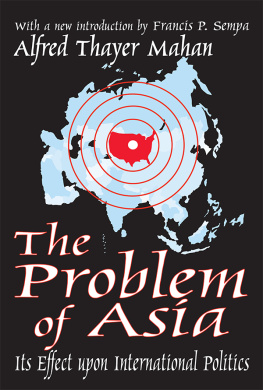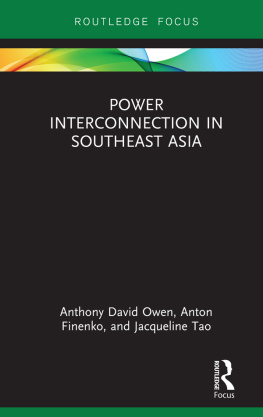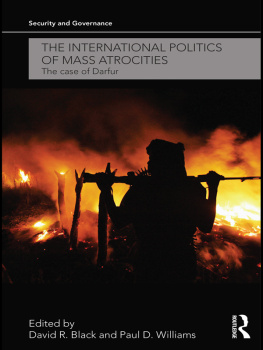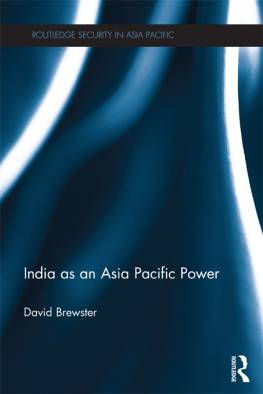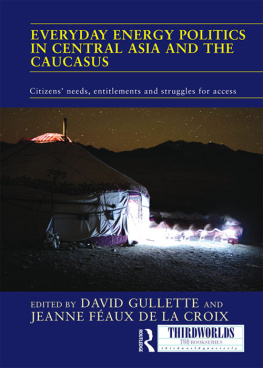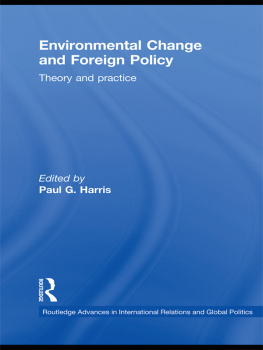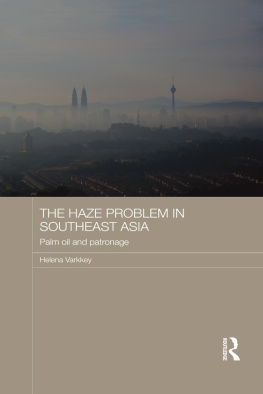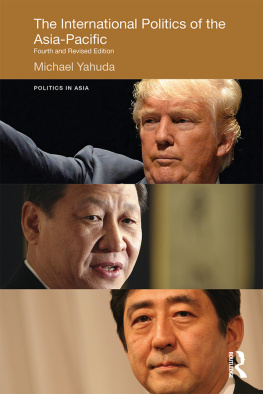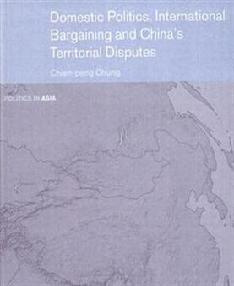Originally published in 1900 by Little, Brown, and Company.
Published year 2003 by Transaction Publishers
Published 2017 by Routledge
2 Park Square, Milton Park, Abingdon, Oxon OX14 4RN
711 Third Avenue, New York, NY 10017, USA
Routledge is an imprint of the Taylor & Francis Group, an informa business
All rights reserved. No part of this book may be reprinted or reproduced or utilised in any form or by any electronic, mechanical, or other means, now known or hereafter invented, including photocopying and recording, or in any information storage or retrieval system, without permission in writing from the publishers.
Notice:
Product or corporate names may be trademarks or registered trademarks, and are used only for identification and explanation without intent to infringe.
Library of Congress Catalog Number: 2002045191
Library of Congress Cataloging-in-Publication Data
Mahan, A. T. (Alfred Thayer), 1840-1914.
The problem of Asia : its effect upon international politics / Alfred Thayer
Mahan ; with a new introduction by Francis P. Sempa.
p. cm.
Originally published as: The problem of Asia and its effect upon
international policies. Boston : Little, Brown, and Co., 1900.
Includes bibliographical references and index.
ISBN 0-7658-0524-3 (pbk. : alk. paper)
1. Eastern question (Far East) 2. United StatesForeign relations
East Asia. 3. East AsiaForeign relationsUnited States. 4. Geopolitics. I.
Title.
DS515.M25 2003
327.730509041dc21
2002045191
ISBN 13: 978-0-7658-0524-9 (pbk)
Introduction to the Transaction Edition
Alfred Thayer Mahan began his writing career just as the United States was becoming a world power in the late nineteenth century. A graduate of the United States Naval Academy who saw limited action in the Union navy during the Civil War (mostly blockade duty), Mahan taught at the Naval War College in Newport, Rhode Island and emerged as this nations greatest and most celebrated naval historian and strategist after the publication in the 1890s of his second book, The Influence of Sea Power upon History 1660-1783, and a two-volume sequel, The Influence of Sea Power upon the French Revolution and Empire. These works were translated into most major foreign languages and are said to have influenced the shipbuilding programs and naval strategies of all of the great powers, including, most conspicuously, Germany and Japan.
Mahan completed his sea power series in 1905 with the publication of Sea Power in its Relation to the War of 1812, also a two-volume work. But these five volumes on naval history and strategyfor which Mahan is most widely knownare only one aspect of his prolific intellectual career. Mahan also authored naval biographies, histories of the naval aspects of the American Civil War, the Spanish-American War, the Boer War, and the American Revolutionary War, a book of Christian belief, a memoir, and a book on naval administration. He also wrote numerous articles and essays for American and British publications, many of which were subsequently collected and published in book form. In all, Mahan authored twenty books, 137 articles, and wrote more than 10,000 letters.
Mahans writings on naval history and strategy continue to be studied and analyzed by current naval officers and naval strategists. For many military theorists, Mahan is to naval war and strategy what Clausewitz is to war in generalthe author of fundamental principles that apply to any age of warfare. It is as a naval historian and strategist that Mahan is most remembered and celebrated.
As readers of this book will discover, however, Mahans most important and enduring intellectual contribution was in the field of geopolitics. Beginning in the early 1890s and continuing until his death in December 1914, Mahan periodically wrote articles and books on contemporary international relations. He often wrote about specific foreign policy issues, but did so in a broad geo-historical manner. He was both a proponent and analyst of Americas rise to world power. Mahan was one of a group of late nineteenth-century intellectuals and statesmena group that included Teddy Roosevelt, Brooks Adams, and Henry Cabot Lodge, among otherswho helped lay the political and intellectual foundation for the coming American Century.
Unfortunately for the researcher and analyst of Mahan, there is no one book, or even a principal book, to go to for a complete understanding of his geopolitical thought. As Harold and Margaret Sprout explained, Mahans philosophy of history and his ideas on world power are scattered hit-or-miss through [his] writings. [I]t is impossible to single out any passage, or group of passages, in which these are concisely summarized. Therefore, Mahans world-view, noted the Sprouts, must be pieced together from fragments plucked from books and articles published through more than two decades of voluminous writing. Perhaps that is why there is no book-length treatment of Mahan as geopolitician.
Not all writers on international relations are geopoliticians. Geo-politics is a method of analyzing international relations that emphasizes spatial relationships and the distribution of political power in a global geographical setting. It focuses on the various elements of national power, but recognizes that geography is the most important element of power because it is the most permanent factor in international relations. With Friedrich Ratzel, Rudolf Kjellen, and Halford Mackinder, Mahan was one of the founders of modern global geopolitical analysis. These writers were followed by, among others, James Fairgrieve, Ellen Semple, Karl Haushofer, Nicholas Spykman, and James Burnham. In our own day, Henry Kissinger, Zbigniew Brzezinski, and Colin Gray are among the most well known writers that have kept alive the flame of geopolitical analysis. All of them owe an intellectual debt to Alfred Thayer Mahan.
Mahan wrote about international relations as a generalist, instead of a specialist. The details of a particular foreign policy situation or crisis were important to Mahan, but he invariably focused on the big picture, emphasizing the more permanent features that affect international politics. This focus enabled Mahan to see beyond the immediate concerns or issues at stake in an international event, in order to grasp the underlying power factors that would affect future events. This approach gave Mahans analyses a prophetic quality that made his writings relevant to future international relations.
That is not to say, of course, that Mahan did not make mistakes in his analyses, or that his predictions about future international relations were always on the mark. Any writer as prolific as Mahan, writing on a subject matter prone to frequent change, will err on some occasions. Mahan, most assuredly, made his share of errors in interpreting world events. But, as will be seen in page after page of The Problem of Asia: Its Effect upon International Politics, Mahans general approach to geopolitical analysis of world events has withstood the test of time.
Every writer and thinker is to some extent shaped by the times in which he lives. Alfred Thayer Mahan lived during a time when the United States came of age in the world. He began his literary career at a time when the United States was still inwardly focused, recovering from the devastating Civil War, and he ended that career when the United States was about to enter the first great global struggle of the twentieth century.

